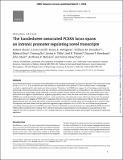The handedness-associated PCSK6 locus spans an intronic promoter regulating novel transcripts
Abstract
We recently reported the association of the PCSK6 gene with handedness through a quantitative genome-wide association study (GWAS; P < 0.5 x 10-8) for a relative hand skill measure in individuals with dyslexia. PCSK6 activates Nodal, a morphogen involved in regulating left-right body axis determination. Therefore, the GWAS data suggest that the biology underlying the patterning of structural asymmetries may also contribute to behavioural laterality, e.g. handedness. The association is further supported by an independent study reporting a variable number tandem repeat (VNTR) within the same PCSK6 locus to be associated with degree of handedness in a general population cohort. Here, we have conducted a functional analysis of the PCSK6 locus combining further genetic analysis, in silico predictions and molecular assays. We have shown that the previous GWAS signal was not tagging a VNTR effect suggesting the two markers have independent effects. We demonstrated experimentally that one of the top GWAS associated markers, rs11855145, directly alters the binding site for a nuclear factor. Furthermore, we have shown that the predicted regulatory region adjacent to rs11855415 acts as a bidirectional promoter controlling the expression of novel RNA transcripts. These include both an antisense long non-coding RNA (lncRNA) and a short PCSK6 isoform predicted to be coding. This is the first molecular characterisation of a handedness-associated locus which supports the role of common variants in non-coding sequences in influencing complex phenotypes through gene expression regulation.
Citation
Shore , R J , Covill , L , Pettigrew , K A , Brandler , W A , Diaz Vazquez , R , Xu , Y , Tello , J , Talcott , J B , Newbury , D F , Stein , J , Monaco , A P & Paracchini , S 2016 , ' The handedness-associated PCSK6 locus spans an intronic promoter regulating novel transcripts ' , Human Molecular Genetics , vol. 25 , no. 9 , pp. 1771-1779 . https://doi.org/10.1093/hmg/ddw047
Publication
Human Molecular Genetics
Status
Peer reviewed
ISSN
0964-6906Type
Journal article
Description
S.P. is a Royal Society University Research Fellow. This work was supported by the Royal Society (grant number RG110387 to S.P.); R.S. was supported by a University of St Andrews PhD scholarship. Genotyping at the Wellcome Trust Centre for Human Genetics was supported by the Wellcome Trust (090532/Z/09/Z) and a Medical Research Council Hub grant (G0900747 91070). Genetic analysis was supported by the St Andrews Bioinformatics Unit funded by the Wellcome Trust (097831/Z/11/Z). D.F.N. is an MRC Career Development Fellow supported by the MRC (G1000569/1 and MR/J003719/1). Funding to pay the Open Access publication charges for this article was provided by the Wellcome Trust.Collections
Items in the St Andrews Research Repository are protected by copyright, with all rights reserved, unless otherwise indicated.

